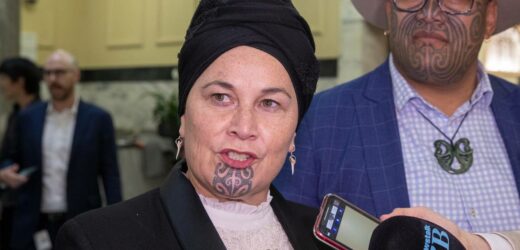The Māori Party says the response to the detection of Covid-19 in New Plymouth wastewater is sloppy and the health minister and officials need to address uncertainty in Taranaki.
Two wastewater samples tested positive at the end of last week, which the Ministry of Health said could be either recently recovered cases shedding the virus, or undetected cases in the community.
The ministry is urging anyone with symptoms, especially in New Plymouth, to get tested as well as anyone in Taranaki who was recently in Australia.
The Māori Party co-leader Debbie Ngarewa-Packer said Taranaki DHB officials couldn’t offer direct answers to queries in a briefing on Monday morning.
“They couldn’t provide a reason South Taranaki wastewater is not being tested; they couldn’t provide us with assurance that we had the capacity to do the degree of testing needed; they couldn’t provide us with an overall Māori strategy that’s being applied in this: they couldn’t confirm for us that we have all ducks lined up should things go wrong.”
Ngarewa-Packer, a leader of South Taranaki’s Ngāti Ruanui, has asked for the health minister Chris Hipkins and his officials to meet directly with iwi leaders to answer the questions.
“It’s sloppy, its sloppy coms and this is exactly why Māori have such reluctance and did their own Covid response.”
She says this is the second round of Covid concerns in Taranaki and it’s not the first time the response has been found wanting.
“If this becomes the worst-case scenario, are we prepared? Do we have a strong uptake of vaccinations, do we have the capacity to do the swab tests, and what strategy is being applied specifically for Māori?”
“What is this, day 4? And no-one has any answers – I sure hope there’s no super-spreader.”
In a statement, the Ministry of Health said latest wastewater tests had come back clear.
The ministry expected further results on Tuesday from tests taken upstream from the usual sampling point in the New Plymouth sewerage network.
It said there was no plan to expand wastewater testing beyond ESR’s regular testing locations, which do not include South Taranaki.
Ngarewa-Packer said local health bosses should be pushing for more.
“You’re Taranaki DHB, you’re not New Plymouth DHB – you’re there for the whole of Taranaki and the whole of Taranaki is seeking assurance that we are safe.”
Meanwhile, the ministry said no one had tested positive for Covid from swabs taken in New Plymouth from Friday, Saturday and some of Sunday.
About 160 swabs were taken in New Plymouth on Sunday and around a quarter of these have returned negative results.
Meanwhile Māori health leaders are unanimous in pushing for Taranaki people to get tested for Covid-19 if they have any symptoms.
Read More
- Covid 19 coronavirus: Two new cases in MIQ, ‘wider’ Taranaki wastewater testing under way – NZ …
- Covid 19 coronavirus: Three historical MIQ cases, New Plymouth wastewater traces likely Delta v…
- Covid 19 coronavirus: Taranaki testing numbers low despite ministry’s appeal – NZ Herald
- Covid 19 coronavirus: Taranaki travellers from Australia should get tested – Ministry of Health…
“Yes, if you’re symptomatic go and get tested,” said Ngarewa-Packer.
The chief executive of Tui Ora healthcare Hayden Wano said it was important for whānau to get tested if there was a chance they had been exposed to Covid-19.
“We’re certainly encouraging whānau who have either been to Australia, or have had come contact with somebody who’s been in Australia, and if they’ve had flu-like symptoms we’re certainly encouraging whānau to have the Covid test.”
Wano said Tui Ora had already sent four staff to work alongside testers at the Taranaki DHB clinic as it ramped up activity over the weekend in the wake of the tests.
He said Tui Ora’s focus lately had shifted from testing to vaccination but the organisation was now looking at how best to support the testing effort, including whether to re-establish its own testing clinics.
“During lockdown we were doing testing and we were taking tests to locations that were convenient for our whānau to be able to access. We were doing stand-up clinics in different places around the mountain.”
Māori are 50 per cent more likely to die of Covid-19 than Pākehā, according to a study published in the New Zealand Medical Journal last September.
Sociology, statistics, physics and cultural history researchers linked ethnic health data in New Zealand with international Covid-19 data.
The study found a number of factors increase the risk:
• More Māori live with multiple underlying health conditions (comorbidities) and people with comorbidities are at greater risk of dying from Covid-19.
• Hospitalisation and fatality rates for Māori and Pacific from the H1N1 influenza pandemic in 2009 were significantly higher than for Pākehā.
• Avoidable hospitalisations are higher for Māori and Pacific due to structural disadvantages.
• Greater involvement in high-risk occupations and environments and larger social networks mean Māori are at greater risk of exposure to Covid.
• Risk factors for accelerated transmission included crowded housing, which affects about 25 per cent of Māori and 45 per cent Pacific.
Source: Read Full Article

/cloudfront-ap-southeast-2.images.arcpublishing.com/nzme/YQWQJVBWFR4YZCCXQLTXET4R3U.jpg)
/cloudfront-ap-southeast-2.images.arcpublishing.com/nzme/WIYWU2UBLIESV7GO4QKXT2ZJRM.jpg)
/cloudfront-ap-southeast-2.images.arcpublishing.com/nzme/JVOVITCVSKU6AGSOPXOBCYH2AY.jpg)
/cloudfront-ap-southeast-2.images.arcpublishing.com/nzme/7H665TXIGXN2HIHZ4HIWI4GQW4.jpg)

